TRU Law had a successful moot court competition season. In addition to TRU Law’s victory at the BC Law Schools’ Moot, and its hosting of the Kawaskimhon Moot, TRU Law participated in six other competitive moots against law schools across Canada. TRU Law took Top Factum at the Wilson Moot and received various distinctions at the Immigration Moot. Mooting is not all about winning, but skill development and preparing students for law practice.
The travelling moot teams received support from the Dr. Sherman Jen Innovation Competition Prize and generous law firm sponsors for three moot teams. Their support for these valuable student experiences is greatly appreciated.
Wilson Moot
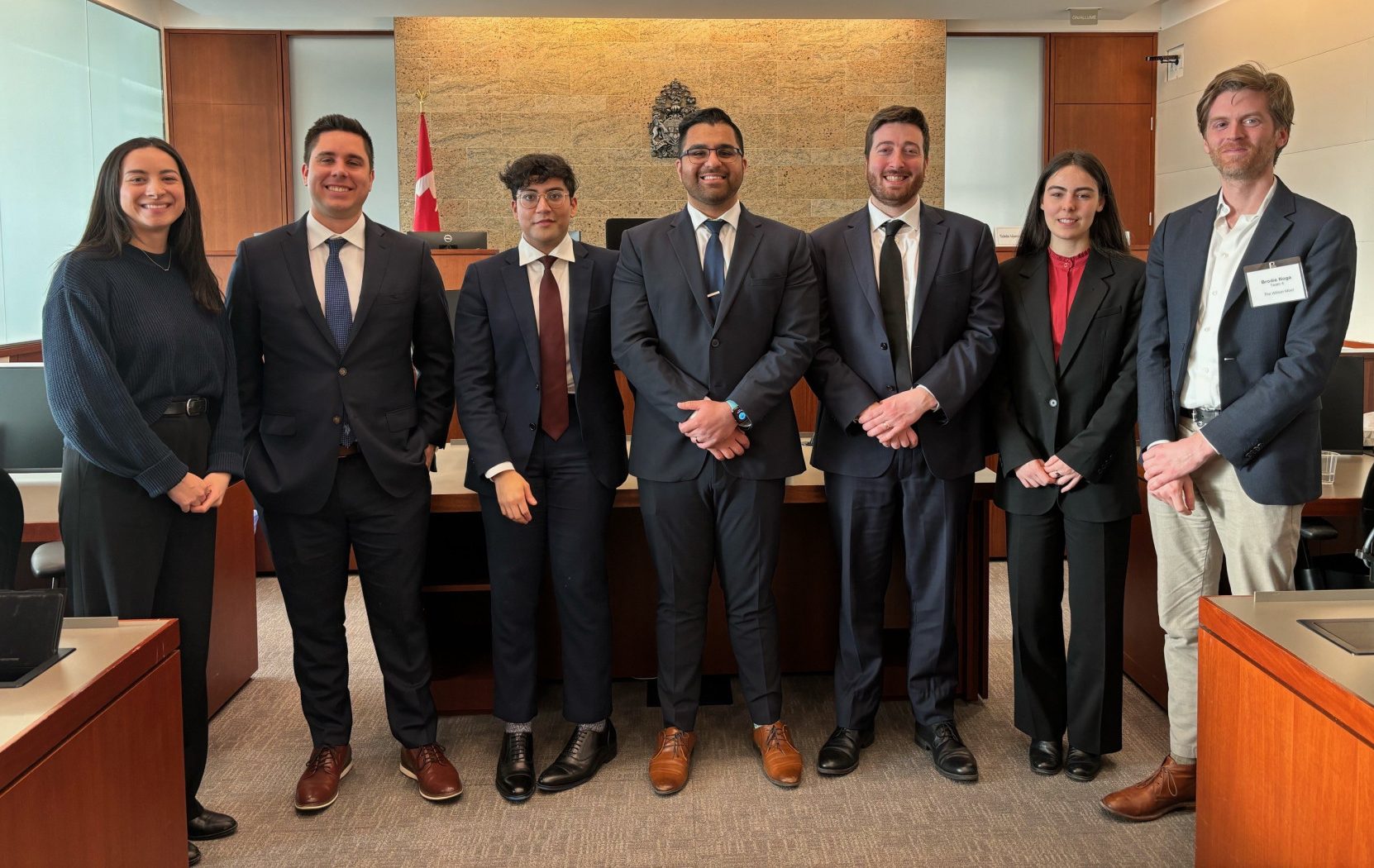
Wilson moot team and coaches (left to right): Emma de Paoli, Russell Walton, Sammy Abbasi, Prince Dhillon, James Singer, Brittany Boutellier and Brodie Noga
TRU Law received the Top Factum prize for the Wilson Moot, held in Toronto on Feb. 23–24. This year’s team included Sammy Abbasi, Brittany Boutellier, Prince Dhillon, James Singer and Russell Walton.
The 2024 Wilson Moot was about a transgender man who was incarcerated in a women’s federal prison. The man at issue transitioned while he was imprisoned and was denied a transfer to a men’s prison. The case examined potential violations of the Charter of Rights and Freedoms.
The team spent almost a week in Vancouver in intensive practices before travelling to Toronto for the moot. The team found the moot to be a uniquely challenging yet rewarding experience that was incomparable to anything they could have learned in a classroom. The team evolved into a close-knit family, forging friendships and memories that will last a lifetime.
Thanks to the coaches Sergio Ortega, Brodie Noga, Emma de Paoli, Karin Kotliarsky and Jane Mayfield.
Immigration, Refugee and Citizenship Moot
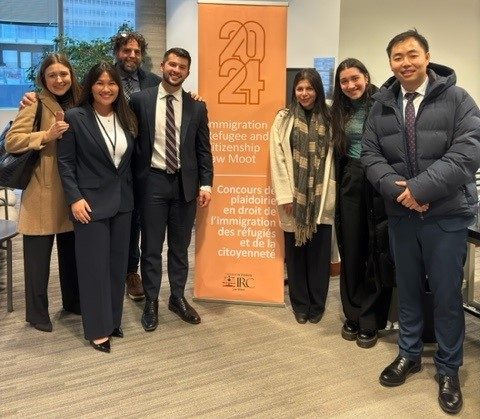
Immigration, Refugee, and Citizenship Moot team and coaches (left to right): Erin Estok, Tamara Luistro, David Knapp, Scott Stewart-Lee, Rosina Hamoni, Ignacia Mendez-Pacheco and Will Wang
This year’s Immigration, Refugee and Citizenship Moot took place on March 1–2, in Toronto. TRU Law did well, winning Top Appellant Team and Second-Best Law School, and Second-Best Factum. The team was made up of Rosina Hamoni, Tamara Luistro, Ignacia Mendez-Pacheco, Scott Stewart-Lee and Will Wang.
The problem focused on the deportation of a convicted gang member — who lived in Canada for 50 years — to the United Kingdom. This was the first year the moot took place in person. In the finals of the competition, the team of Wang and Stewart-Lee competed in a bilingual round against the University of Ottawa and were judged by Canada Supreme Court Justice Karakastanis, Federal Court of Appeal Justice Locke and Federal Court Associate Chief Justice Gagné.
Wang found the moot to be a transformative and rewarding experience, while Stewart-Lee would recommend it to anyone with even a slight interest in immigration law. The coaches were equally enthused with the moot. Coach David Knapp mentioned that the TRU Lawmade such a great impression on the immigration bar and really represented the school well, while coach Erin Estok found the team to be a particularly collaborative and friendly team, in addition to the excellent legal skills they brought to this competition.
Thanks to the coaches David Knapp and Erin Estok.
Davies Corporate/Securities Moot
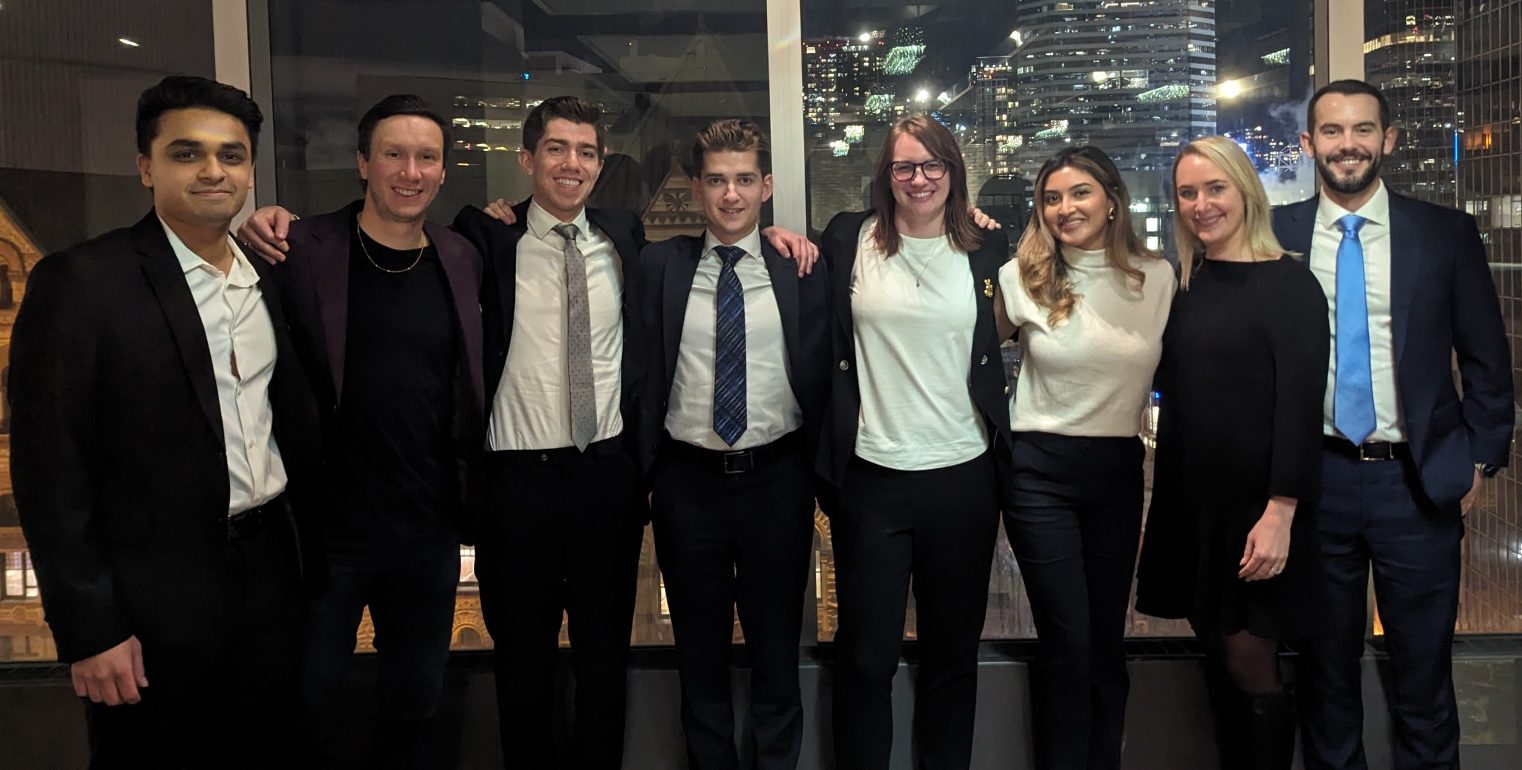
Davies Corporate/Securities Moot team and coaches (left to right): Ali Syed, James Reid, Jack McDonnell, Ian Hunter, Jessica Dudenhoeffer, Loveleen Sandhu, Chelsea Hunter and Joe Ensom
This year was the second time TRU Law participated in the Davies Corporate/Securities Moot, held in Toronto on March 8–9. The team was made up of Jessica Dudenhoeffer, Ian Hunter, Jack McDonnell, Loveleen Sandhu and Ali Syed.
The problem focused on a deal gone bad. One company was about to buy another out, but there were some problems including licence renewals, breaches of fiduciary duties over sharing of confidential information and breaches of the duty of good faith.
The team found that mooting prepared students for practice, such as receiving feedback on work product and learning how to argue at the appellate level. Others focused on the value in diving into details on corporate law.
Thanks to the coaches Chelsea Hunter, James Reid and Joe Ensom. A significant thanks also goes to the moot’s sponsor, Poulus Ensom Smith LLP.
Jessup International Law Moot
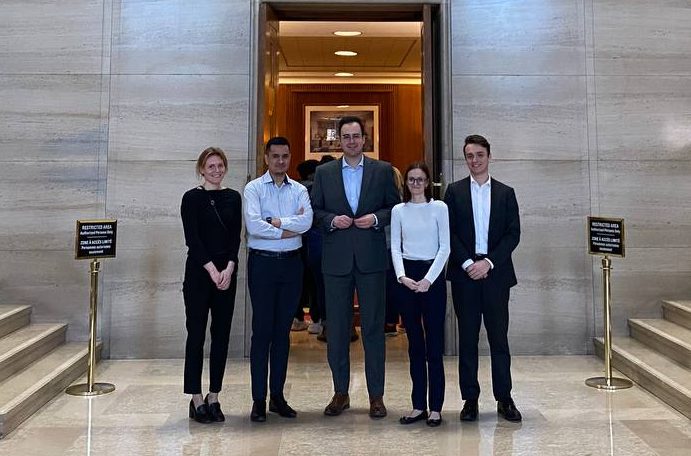
Jessup International Law Moot team (left to right): Emily Redekop, Brent Isfeld, Lucas O’Fee, Julie Nimmock and Randy O’Brien
This year, the Jessup Moot team travelled to Ottawa. The team was comprised of Brent Isfeld, Julie Nimmock, Randy O’Brien, Lucas O’Fee and Emily Redekop.
The Jessup Moot usually focused on cutting-edge international law problems, and this year’s moot was no different. The problem focused on statelessness and the right to a nationality, consular relations, the tensions between international human rights and state sovereignty, and the binding nature of UN Security Council resolutions.
The moot was judged by practicing lawyers, judges and members of Canada’s foreign service. Many Jessup judges were former Jessupers themselves, creating a valuable networking opportunity. Redekop found that the moot enhanced her understanding of the intricacies of international law and broadened my perspective on legal systems and the law in general. Meanwhile, O’Fee found it to be exhilarating talking about complex international law matters with real experts in the field.
Thanks to the coaches Alex Devitt, Natasha Little, Greg Pun, KC, and Dr. Ryan Gauthier. Appreciative thanks also to the moot’s sponsor, Gillespie and Company LLP.
MacIntyre Cup
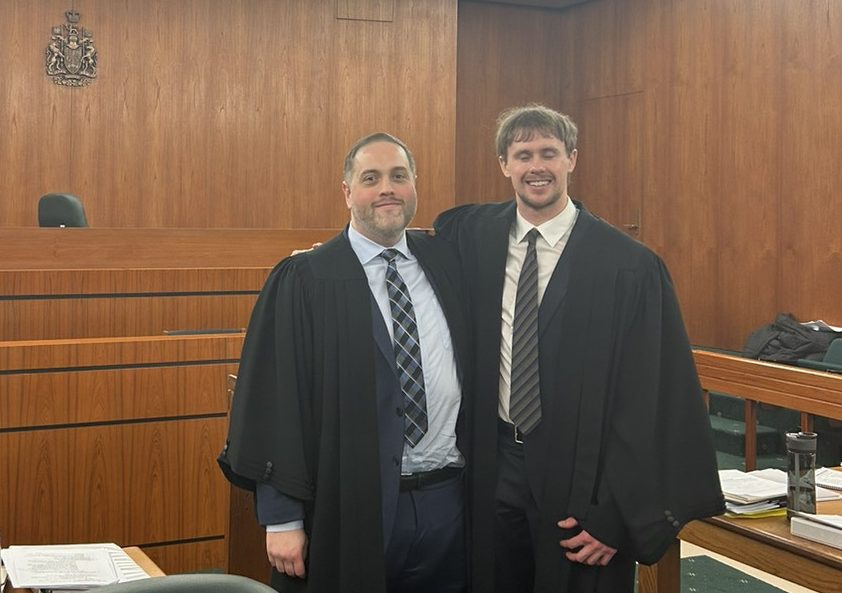
MacIntyre Cup team (left to right): Eric Cook and AJ Roberts
This year’s MacIntryre Cup team travelled to Edmonton. The MacIntyre Cup is a trial advocacy moot, generally focusing on a criminal law issue. The trial is presided over by a sitting judge and volunteers play the roles of witnesses and jury. This year’s team was made up of Eric Cook and AJ Roberts.
The team conducted a trial related to a nightclub owner. The question was whether the owner committed aggravated assault when he struck a disgruntled former employee, and if it could be justified as self-defence.
The TRU team found they had to be adaptable when confronted with a judge who made rulings against them on issues of evidence. This will serve the team well in the future, as they will encounter all manner of judges in practice. Cook noted that doing the moot with his good friend Roberts made the experience very enjoyable.
Thanks to the coaches Kelly Melnyk, Iain Currie and Lana Walker.
Family Law Negotiation Moot
This year’s team was made up of Ashley Desautels, Larissa DeWolff, Jaya Gill and Hannah LaRoy.
The students represented a wife who was separating from her husband. The parties negotiated issues such as child support, property division and relocation of their children. The competition took place over three days and was done virtually.
While preparing for their moot, the team negotiated against practicing family lawyers. They enjoyed learning how to adapt to different negotiation styles and found the moot helped them learn more about practical aspects of family law while gaining negotiation skills that will help in any area of law.
Thanks to the coaches Amanda Winters and Sara Hillard.

